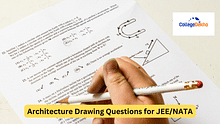
GATE Chemistry (CY) Syllabus 2024: IISc Bangalore has released the GATE 2024 Syllabus for Chemistry. The GATE exam 2024 for Chemistry papers will be conducted on February 4, 2024, in online mode for a total of 100 marks. Candidates who choose Chemistry paper must refer to the official GATE syllabus to prepare for the exam as questions will be within the specified syllabus. The GATE 2024 Chemistry syllabus includes 3 main sections namely Organic Chemistry, Inorganic Chemistry, and Physical Chemistry. Along with that, candidates also need to attempt 15 questions from the General Aptitude section which is common for all the GATE papers. To ace the exam with flying colors, students must study each and every topic of the Chemistry syllabus. Some of the GATE 2024 Chemistry important topics that students should focus on are Chemical Equilibrium, Heterocyclic Compounds, Chemical Kinetics, Structure, Transitional Elements, etc. In this post, we have provided the complete GATE 2024 Chemistry syllabus along with topics-wise weightage that students can refer to
Also read: GATE Syllabus 2024
GATE Chemistry Syllabus 2024
Candidates can check the section-wise GATE 2024 Chemistry syllabus given below. Understanding and analyzing the syllabus will help candidates prepare their GATE 2024 study plan smartly according to what topics they already know and what topics they need to start fresh.
GATE 2024 Chemistry Syllabus for Physical Chemistry
Check the GATE syllabus 2024 for the Physical Chemistry section given below.
- Structure: Postulates of quantum mechanics. Operators. Time dependent and time independent Schrödinger equations. Born interpretation. Dirac bra-ket notation. Particle in a box: infinite and finite square wells; concept of tunnelling; particle in 1D, 2D and 3D-box; applications. Harmonic oscillator: harmonic and anharmonic potentials; hermite polynomials. Rotational motion: Angular momentum operators, Rigid rotor. Hydrogen and hydrogen-like atoms : atomic orbitals; radial distribution function. Multi-electron atoms: orbital approximation; electron spin; Pauli exclusion principle; slater determinants. Approximation Methods: Variation method and secular determinants; first order perturbation techniques. Atomic units. Molecular structure and Chemical bonding: Born- Oppenheimer approximation; Valence bond theory and linear combination of atomic orbitals – molecular orbital (LCAO-MO) theory. Hybrid orbitals. Applications of LCAO-MO theory to H2+, H2; orbital theory (MOT) of homo- and heteronuclear diatomic molecules. Hückel approximation and its application to annular π – electron systems.
- Spectroscopy: Atomic spectroscopy; Russell-Saunders coupling; Term symbols and spectral details; origin of selection rules. Rotational, vibrational, electronic and Raman spectroscopy of diatomic and polyatomic molecules. Line broadening. Einstein’s coefficients. Relationship of transition moment integral with molar extinction coefficient and oscillator strength. Basic principles of nuclear magnetic resonance: gyromagnetic ratio; chemical shift, nuclear coupling.
- Group theory: Symmetry elements and operations; Point groups and character tables; Internal coordinates and vibrational modes; symmetry adapted linear combination of atomic orbitals (LCAO- MO); construction of hybrid orbitals using symmetry aspects.
- Equilibrium: Laws of thermodynamics. Standard states. Thermo Chemistry. Thermodynamic functions and their relationships: Gibbs-Helmholtz and Maxwell relations, Gibbs-Duhem equation, van’t Hoff equation. Criteria of spontaneity and equilibrium. Absolute entropy. Partial molar quantities. Thermodynamics of mixing. Chemical potential. Fugacity, activity and activity coefficients. Ideal and Non-ideal solutions, Raoult’s Law and Henry’s Law, Chemical equilibria. Dependence of equilibrium constant on temperature and pressure. Ionic mobility and conductivity. Debye-Hückel limiting law. Debye-Hückel-Onsager equation. Standard electrode potentials and electrochemical cells. Nernst Equation and its application, relationship between Electrode potential and thermodynamic quantities, Potentiometric and conductometric titrations. Phase rule. Clausius- Clapeyron equation. Phase diagram of one component systems: CO2, H2O, S; two component systems: liquid- vapour, liquid-liquid and solid-liquid systems. Fractional distillation. Azeotropes and eutectics. Statistical thermodynamics: microcanonical, canonical and grand canonical ensembles, Boltzmann distribution, partition functions and thermodynamic properties
- Surfaces and Interfaces: Physisorption and chemisorption. Langmuir, Freundlich and Brunauer– Emmett–Teller (BET) isotherms. Surface catalysis: Langmuir-Hinshelwood mechanism. Surface tension, viscosity. Self-assembly. Physical Chemistry of colloids, micelles and macromolecules.
- Kinetics (Topic have been rearranged): Elementary, parallel, opposing and consecutive reactions. Steady state approximation. Mechanisms of complex reactions. Unimolecular reactions. Potential energy surfaces and classical trajectories, Concept of Saddle points, Transition state theory: Eyring equation, thermodynamic aspects. Kinetics of polymerization. Catalysis concepts and enzyme catalysis. Kinetic isotope effects. Fast reaction kinetics: relaxation and flow methods. Diffusion controlled reactions. Kinetics of photochemical and photophysical processes.
GATE Chemistry Syllabus 2024 for Inorganic Chemistry
The complete GATE 2024 syllabus for Inorganic Chemistry is provided below.
Section | Topics |
|---|---|
Main Group Elements | Hydrides, halides, oxides, oxoacids, nitrides, sulfides – shapes and reactivity. Structure and bonding of boranes, carboranes, silicones, silicates, boron nitride, borazines and phosphazenes. Industrial synthesis of compounds of main group elements. Chemistry of noble gases, pseudohalogens, and interhalogen compounds. Allotropes of carbon, phosphorous and sulphur. Acid-base concepts and principles (Lewis, Brønsted, HSAB and acid-base catalysis). |
Bioinorganic Chemistry: | Ion (Na+ and K+) transport, oxygen binding, transport and utilization, electron transfer reactions, nitrogen fixation, metalloenzymes containing magnesium, molybdenum, iron, cobalt, copper and zinc. |
Transition Element | Coordination Chemistry – structure and isomerism, theories of bonding (VBT, CFT, and MOT).Electronic spectra of transition metal complexes: spectroscopic term symbols, selection rules, Orgel and Tanabe-Sugano diagrams, nephelauxetic effect and Racah parameter, charge-transfer spectra. Energy level diagrams in various crystal fields, CFSE, applications of CFT, Jahn- Teller distortion. Magnetic properties of transition metal complexes. Ray-Dutt and Bailar twists, Reaction mechanisms: kinetic and thermodynamic stability, substitution and redox reactions. Metal-metal multiple bond. |
Organometallics | 18-Electron rule; metal-alkyl, metal-carbonyl, metal-olefin and metal- carbene complexes and metallocenes. Fluxionality in organometallic complexes. Heterogeneous catalysis - Fischer- Tropsch reaction, Ziegler-Natta polymerization. Types of organometallic reactions. Homogeneous catalysis - Hydrogenation, hydroformylation, acetic acid synthesis, metathesis and olefin oxidation. |
Radioactivity | Detection of radioactivity, Decay processes, half-life of radioactive elements, fission and fusion processes. |
Transition Elements | Lanthanides and Actinides: Recovery. Periodic properties, spectra and magnetic properties. |
Instrumental Methods of Analysis: | UV-visible, fluorescence and FTIR spectrophotometry, NMR and ESR spectroscopy, mass spectrometry, atomic absorption spectroscopy, Mössbauer spectroscopy (Fe and Sn) and X-ray crystallography. Chromatography including GC and HPLC. Electroanalytical methods- polarography, cyclic voltammetry, ion-selective electrodes. Thermoanalytical methods. |
Solids | Crystal systems and lattices, Miller planes, crystal packing, crystal defects, Bragg’s law, ionic crystals, structures of AX, AX2, ABX3 type compounds, spinels, band theory, metals and semiconductors. |
GATE 2024 Chemistry Syllabus for Organic Chemistry
Go through the detailed GATE 2024 syllabus for Organic Chemistry given below.
- Reaction Mechanisms: Basic mechanistic concepts – kinetic versus thermodynamic control, Hammond’s postulate and Curtin-Hammett principle. Methods of determining reaction mechanisms through kinetics, identification of products, intermediates and isotopic labelling. Linear free-energy relationship – Hammett and Taft equations. Nucleophilic and electrophilic substitution reactions (both aromatic and aliphatic). Addition reactions to carbon-carbon and carbon-heteroatom (N and O) multiple bonds. Elimination reactions. Reactive intermediates – carbocations, carbanions, carbenes, nitrenes, arynes and free radicals. Molecular rearrangements.
- Stereochemistry: Chirality and symmetry of organic molecules with or without chiral centres and determination of their absolute configurations. Homotopic, enantiotopic and diastereotopic atoms, groups and faces. Stereoselective and stereospecific synthesis. Conformational analysis of acyclic and cyclic compounds. Relative stereochemistry in compounds having more than one stereogenic centre. Geometrical isomerism and optical isomerism. Configurational and conformational effects, atropisomerism, and neighbouring group participation on reactivity and selectivity/specificity.
- Organic Synthesis: Synthesis, reactions, mechanisms and selectivity involving the following classes of compounds – alkenes, alkynes, arenes, alcohols, phenols, aldehydes, ketones, carboxylic acids, esters, nitriles, halides, nitro compounds, amines and amides. Uses of Mg, Li, Cu, B, Zn, P, S, Sn and Si based reagents in organic synthesis. Concepts of multistep synthesis - retrosynthetic analysis, strategic disconnections, synthons and synthetic equivalents. Atom economy and Green Chemistry, Umpolung reactivity – formyl and acyl anion equivalents. Selectivity in organic synthesis – chemo-, regio- and stereoselectivity. Carbon-carbon bond formation through coupling reactions - Heck, Suzuki, Stille, Sonogoshira, Negishi, Kumada, Hiyama, Tsuji-Trost, olefin metathesis and McMurry. Protection and deprotection of functional groups. Concepts of asymmetric synthesis – resolution (including enzymatic), desymmetrization and use of chiral auxiliaries, organocatalysis. Carbon-carbon and carbon-heteroatom bond forming reactions through enolates (including boron enolates), enamines and silyl enol ethers. Stereoselective addition to C=O groups (Cram, Prelog and Felkin-Anh models).
- Heterocyclic Compounds: Structure, preparation, properties and reactions of furan, pyrrole, thiophene, pyridine, indole, quinoline and isoquinoline.
- Pericyclic Reactions and PhotoChemistry: Electrocyclic, cycloaddition and sigmatropic reactions. Orbital correlations - FMO and PMO treatments, Woodward-Hoffmann rule. Photo Chemistry of alkenes, arenes and carbonyl compounds. Di-π-methane rearrangement, Barton-McCombie reaction, Norrish type-I and II cleavage reaction. Photooxidation and photoreduction.
- Experimental techniques in organic Chemistry: Optical rotation (polarimetry). Applications of various chromatographic techniques such as thin-layer, column, HPLC and GC. Applications of UV-visible, IR, NMR and Mass spectrometry in the structural determination of organic molecules.
- Biomolecules: Structure, properties and reactions of mono- and di-saccharides, physicochemical properties of amino acids, chemical synthesis of peptides, chemical structure determination of peptides and proteins, structural features of proteins, nucleic acids, lipids, steroids, terpenoids, carotenoids, and alkaloids.
Related Links:
GATE Chemistry Syllabus 2024 Topic-Wise Weightage
GATE 2024 Chemistry syllabus topic-wise weightage will help candidates understand what are the key topics of the syllabus from which questions are generally asked. Based on the previous year's GATE Chemistry paper analysis, the overall trend of the GATE Chemistry paper in terms of the weightage of the specific topics is provided below.
Section | Approx Number of Questions Asked |
|---|---|
Organics Synthesis | 5 |
Chemical Kinetics | 5 |
Chemical Equilibrium | 4 |
Stereochemistry | 4 |
Group Theory | 3 |
Transitional Elements | 3 |
Reaction Mechanisms | 5 |
Main Group Elements | 4 |
Biomolecules | 2 |
Experimentation Techniques in Organic Chemistry | 2 |
Spectroscopy | 2 |
Organometallics | 3 |
Structure | 3 |
Pericyclic Reactions and Photochemistry | 2 |
Solids | 2 |
Radioactivity | 2 |
Heterocyclic Compounds: | 2 |
Radioactivity | 2 |
Note- The GATE 2024 Chemistry topic-wise weightage given above is tentative as per the previous year analysis. Candidates must study the complete syllabus of GATE 2024 to score good marks in the exam.
Also Read: GATE 2024 Highest Scoring & Important Topics
GATE Chemistry Syllabus 2024 PDF Download
Candidates download the official GATE 2024 syllabus PDF of chemistry paper from the link given below.GATE 2024 Chemistry Exam Pattern
Applicants participating in the GATE exam 2024 can appear for two papers but only from the authorized combination list, which is published on the official website. Chemistry (CY) papers can be combined with Engineering Sciences (XE) or Life Sciences (XL). Along with analyzing the syllabus, it is important to understand the exam pattern.
We have provided the GATE exam pattern 2024 for the Chemistry paper below.
- The GATE exam will be administered via online mode; Computer Based Test (CBT).
- The GATE Chemistry Exam will have 65 questions that candidates must answer in three hours.
- The GATE CY paper is worth 100 marks, comprising 15 marks for general aptitude and 85 marks for chemistry.
- The test will have two types of questions: MCQs and NAT.
Section | No. of Questions | Type of Questions | Marks | Duration |
|---|---|---|---|---|
Chemistry | 55 | MCQ or MSQ or NAT | 85 | 3 hours |
General Aptitude | 10 | MCQ | 15 | |
Total | 65 | - | 100 |
Also Read: GATE Chemistry (CY) Cutoff 2023
GATE 2024 Chemistry Marking Scheme
The GATE marking scheme for Chemistry paper has been specified below.
Question Type | Negative marking for Wrong answer |
|---|---|
MCQs | 1/3 for 1 mark questions 2/3 for 2 marks questions |
MSQ/NATs | No negative marking |
In addition, you can also look at the following articles that will help you with your GATE 2024 exam preparation.
GATE Mechanical Engineering 2024 Preparation Strategy & Study Plan | |
GATE 2024 Petroleum Engineering Preparation Strategy & Important Topics | |
GATE 2024 Civil Engineering Preparation Strategy & Study Plan | |
We hope that this post on GATE Chemistry (CY) Syllabus 2024 was helpful and informative.

















Similar Articles
Documents Required to Fill NATA 2024 Application Form - Photo Upload, Specifications, Scanned Images
Guidelines to Fill NATA 2024 Application Form
Is Physics and Chemistry Still a Part of the NATA Syllabus?
NATA Sample Questions 2024
Architecture (B Arch/B Planning) Drawing Questions for All Exams: JEE Main, JEE Advanced, NATA
List of Colleges Expected for 15,000 Rank in JEE Main 2024